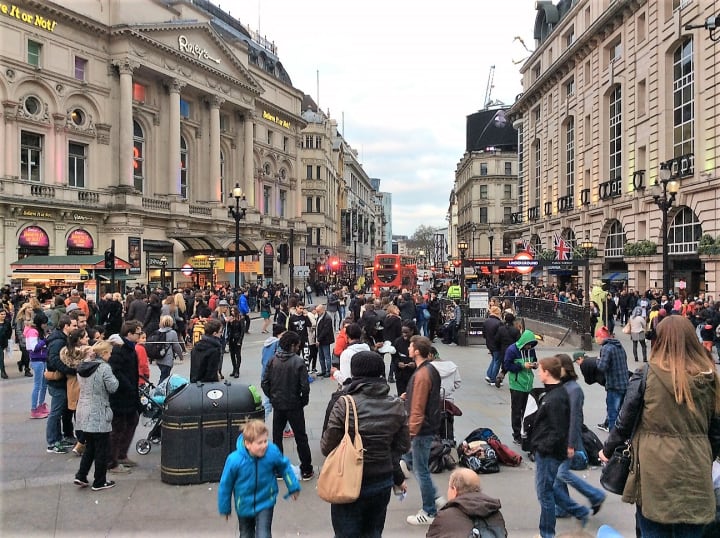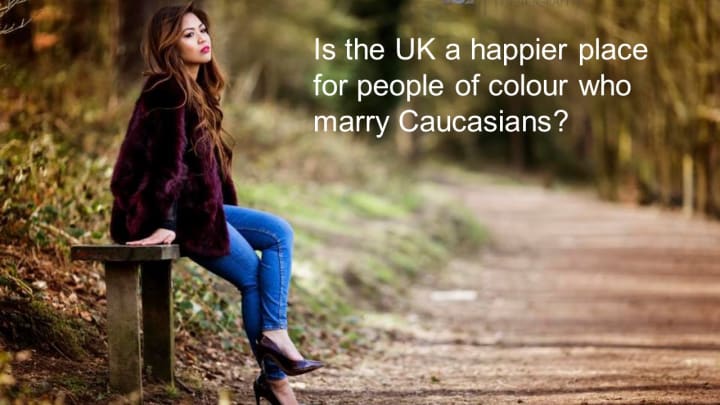A Color-Blind Society Is My Happy Place
Is the UK a happier place for people of color who marry Caucasians?

NEVER in my life have I shared my personal experiences in relation to that contentious R word, until now. The vexation I felt at the time, nonetheless, was transitory as my peace-loving nature was more tenacious.
Looking back, however, should I perhaps have made a fuss and use the racism card?
But again, that would be contrary to my placid nature. I was never one to raise the so-called R card to whinge and whine.
Called a whore for being with a Caucasian
MY first experience was rather freaky, eons ago, and possibly not even related to the R word as we know it. My new husband and I were in Manila for a brief holiday. While struggling to hail a cab amidst the chaotic traffic on a rainy, dark evening, an elderly female in charcoal-grey midi-dress screamed at me, calling me a whore (in the local language).
I turned my head and looked at the local woman, confused as to why I was being called names.
The blazing hatred in the woman’s eyes terrified me. It was surreal. If I were in the middle of a horror film, I’d probably shriek in terror. In a blink, however, I realized that I was being scorned (by the strange woman) for being in the company of a white man.
Called a 'chink' for being Asian

BACK in New Zealand, two girls in their late teens used to take the 434 to the city center from a South Auckland bus stop. This was where I took the 434 regularly to work, at the University of Auckland. The two were always already there at the bus stop when I arrived. Each time of the few times they were there, they giggled, childishly, their back in front me but glancing at me surreptitiously, referring to me as chink.
They definitely did not know any better, these girls, I thought. They must have called all Asians chink, or everyone with brown skin, black hair and almond eyes.
They stopped taking the 434 soon after one of them accompanied her friend, a student, who handed to me his essay. It was three days after the third term. His essay was certainly late. But ever the considerate me, I had agreed earlier to this student’s earnest request that I stay half an hour after my hours and wait for his submission.
Since then, no more immature teens chirping “chink” at the bus stop were observed for the Manurewa-7:35 a.m. 434 bus to central Auckland.
Disapproved of for marrying a white man
THEN there’s the check-out cashiers one of whom I encountered in Wellington, another in Auckland, and yet another one in Sydney.
Despite the Tasman Sea separating New Zealand and Australia, the three cashiers in a similar manner tossed derisive glances at me while they punched in the price of the items that I, with my husband, had bought.
There was no doubt that they disapproved of me, a colored woman, in the company of a white man.
Viewed as a commodity
WHAT distressed me a minute longer was when the lawn man, one weekend, spoke to my husband in low tones, asking how much he spent in “bringing” me over to the country.
As if I was a commodity!
Not wanting to disrupt my inner harmony longer than necessary, I vented at my husband for a few minutes then pushed the offensive query into my memory bank.
Needless to say, the lawn man lost his contract cutting the grass in the rather large back garden in our first house.
Happy Places With No R Card
WHAT enabled me to be oblivious to those lamentable incidents was because I was in a happy place. I refer to a place where the R card did not exist, at the university where I worked.
The academic staff and general staff – and the student population especially – consisted of people of all colors, of different nationalities from Oceania, Europe, North America and the Far East.
True, majority of the academic staff were Caucasians but in my years of working in this happy place, the R word was firmly not in the vocabulary.
The same could be said in the corporate world that I have just recently left. While the nationalities of those in all levels of management and in the rank-and-file were not as widely multi-cultural as in my previous employment, there was no discrimination based on race.
Meritocracy was practiced.
Life-Work balance was encouraged.
Care for the environment and the role each staff plays in this, wherever we were based in the world, was a big thing.
Everyone was given opportunities for upskilling towards a chance to move up the career ladder.
I’m not saying that what I left was perfect – don’t start me on the stresses of daily deadlines – but a work environment where the R card was never an issue was more than gratifying.
A Happier Place…?

IT was, perhaps, plain luck on my part that saved me from not experiencing toxic acts of racism during those years. My being among color-blind people was a blessing, something that I recognized after learning some of the unfortunate situations experienced by other Asians.
I was also spared the despair of many non-whites whose stories broke my heart, one of which was about the Windrush scandal in the UK, where I am now based for many years.
But before the above controversy erupted, I already had the impression that the UK was a happier place in relation to the contentious R word. This was based on the number of inter-racial couples, many with happy little kids in tow, that I’ve observed – in parks, in restaurants, in holiday places, at the malls. Mainstream media also validated my first impression as I read and watched interviews, shows and photo-stories featuring inter-racial couples.
What then could be a clearer sign that I was in a color-blind society than seeing couples of mixed race, with those around not giving them disapproving looks? I’m not only referring to Caucasian men married to or in partnership with brown-skinned and almond-eyed women. What initially shocked me – in a nice way – was observing Caucasian women with their non-white partners. I asked myself where have I been all these years for not having discerned the changing social attitude towards biracial partnerships?
According to the Office for National Statistics or ONS, one in ten people in the UK was in an inter-ethnic relationship. And analysis within the mixed group showed that people with one black Caribbean and one white parent made up the majority. The rest of the inter-racial groups in this part of the world was made up of Asian/white and black African/white couples.
“Filipina Thai Bride”

So, is the UK a happier place for people of color who marry Caucasians as I initially believed?
My answer would be yes, which is strictly my personal opinion, but this yes could be shifted towards a hearty yes.
As in every facet of life and society, everything can be enhanced for the better. Or put it this way, there will always be imperfections. But as I deemed this part of the world a happier place being mostly accepting of inter-racial couples, consider these few quips:
“Why is your English good?” – said with disbelief;
“How did you learn to speak good English?” – with incredulity;
“So, where’s my friend’s Filipina Thai Bride?” – with unconcealed bigotry not only towards the women of the Philippines but also those of Thailand.
Despite the above surprisingly insulting if not hurtful remarks, whether uttered in my face or behind my back, I remain cheerful and hopeful for a completely color-blind society.
It will then be a really happy place! ###
Find me on the following:
Blog: Creative Writing for Beginners
Facebook: Budding Writers' Corner
Instagram: ja.crispin
About the Creator
Josephine Crispin
Writer, editor, and storyteller who reinvented herself and worked in the past 10 years in the media intelligence business, she's finally free to write and share her stories, fiction and non-fiction alike without constraints, to the world.






Comments
There are no comments for this story
Be the first to respond and start the conversation.